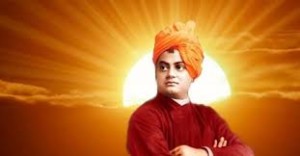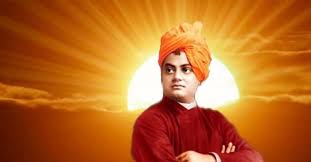 Swami Vivekananda
Swami Vivekananda
The Hindus found their creed upon the ancient Vedas, a word derived from Vid, “to know”. These are a series of books which, to our minds, contain the essence of all religion; but we do not think they alone contain the truths. They teach us the immortality of the soul.
In every country and every human breast there is a natural desire to find a stable equilibrium — something that does not change. We cannot find it in nature, for all the universe is nothing but an infinite mass of changes. But to infer from that that nothing unchanging exists is to fall into error.
The Vedanta philosophy teaches that man is not bound by his five senses. They only know the present, and neither the future nor the past; but as the present signifies both past and future, and all three are only demarcations of time, the present also would be unknown if it were not for something above the senses, something independent of time, which unifies the past and the future in the present.
But what is independent? Not our body, for it depends upon outward conditions; nor our mind, because the thoughts of which it is composed are caused. It is our soul. The Vedas say the whole world is a mixture of independence and dependence, of freedom and slavery, but through it all shines the soul independent, immortal, pure, perfect, holy. For if it is independent, it cannot perish, as death is but a change, and depends upon conditions; if independent, it must be perfect, for imperfection is again but a condition, and therefore dependent.
And this immortal and perfect soul must be the same in the highest God as well as in the humblest man, the difference between them being only in the degree in which this soul manifests itself. But why should the soul take to itself a body? For the same reason that I take a looking-glass — to see myself. Thus, in the body, the soul is reflected. The soul is God, and every human being has a perfect divinity within himself, and each one must show his divinity sooner or later.
Every religion has it that man’s present and future are modified by the past, and that the present is but the effect of the past. How is it, then, that every child is born with an experience that cannot be accounted for by hereditary transmission? How is it that one is born of good parents, receives a good education and becomes a good man, while another comes from besotted parents and ends on the gallows?
How do you explain this inequality without implicating God? Why should a merciful Father set His child in such conditions which must bring forth misery? It is no explanation to say God will make amends; later on — God has no blood-money.
If I cannot be the maker of my own fortune, then I am not free. I take upon myself the blame for the misery of this existence, and say I will unmake the evil I have done in another existence. This, then, is our philosophy of the migration of the soul. We come into this life with the experience of another, and the fortune or misfortune of this existence is the result of our acts in a former existence, always becoming better, till at last perfection is reached.
Excerpted from of a lecture delivered before the Ethical Society, Brooklyn, on 30th December, 1894. The 116th death anniversary of Swami Vivekananda is being observed on July 4.







